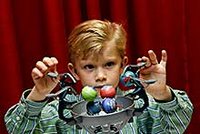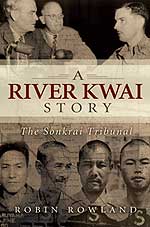In one way, I am not surprised, as the son of Second World War POW, abuse like that is of great interest to all who have that legacy and so it is no surprise that the Senator, who was, of course, a prisoner of the North Vietnamese, would have a strong interest in the subject.
But is, as far as I know, the firs time since the Second World War, that an American politician of McCain's stature has brought up the subject of Japanese waterboarding. It is certainly the first time that a presidential candidate has discussed Japanese waterboarding on a major network news show like 60 Minutes.
Here is the key quote:
Pelley asked him about American interrogation methods today. Asked if water boarding is torture, McCain said, "Sure. Yes. Without a doubt."
"So the United States has been torturing POWs?" Pelley asked.
"Yes. Scott, we prosecuted Japanese war criminals after World War II.
And one of the charges brought against them, for which they were convicted, was that they water-boarded Americans," McCain said.
You can read the complete 60 Minutes interview here
Here is my account of the infamous Double Tenth waterboarding case in Singapore in 1943.
I first blogged about Waterboarding is a War Crime in November 2005.
Despite the claims of U.S. officials, waterboarding is not an effective interrogation technique.
You can read the entire blog entry but here is the bottom line summary. British and Australian commandos raided Singapore harbour and successfully blew up ships. The Japanese secret police believed it was civilian internees who committed the sabotage.
So the Japanese tortured their suspects, who under water boarding, and other tortures confessed to taking part in a commando raid they knew nothing about.
Related link: An account of the waterboarding of American POWs by the Japanese during the Second World can be found here from Georgtown University.
Watch the 60 Minutes interview with Republican presidential candidate, Senator John McCain:
Now that Senator McCain has raised the issue, and raised it as part of the campaign, I hope that more people will take a closer look at how the Japanese decided to ignore the Geneva Convention and how the Far East war crimes trials dealt with the issue.
For me this is probably the most interesting U.S. presidential campaign in my lifetime. All three candidates have admirable qualities. (John McCain has also got good poilcies on climate change)
Technorati tags
writing, journalism, Burma Thailand Railway, World War II, John McCain,F Force, Prisoner of War,military tribunal, torture, law, book, waterboarding, water torture, 60 Minutes, CBS,POW
Labels: A River Kwai Story, Burma Thailand Railway, CBS, climate change, Geneva Convention, Guantanamo, Japan, John McCain, Singapore, torture, war crime, water torture, waterboarding, World War II
Promotion for A River Kwai Story, from my agent Waterside Productions.
Australian publishers Allan and Unwin will reveal the long-held secrets of the River Kwai Story in their April 2008 publication of A River Kwai Story, The Sonkrai Tribunal by Waterside Author Robin Rowland.According to the author, more prisoners of war died at Sonkrai than any other camp on the infamous River Kwai Railway. The seven thousand Australian and British prisoners of war who comprised F Force were sent by the Japanese to build the toughest section of the railway in the mountains between Thailand and Burma. More than three thousand people died from slave labour, disease, starvation and exposure to the never-ending monsoon rain.
In 1946 seven former guards from the infamous River Kwai camp were put on trial for their lives before a military tribunal in Singapore, charged with the deaths of more than three thousand people. The account of the trial tells for the first time the story of F Force from all sides-Australian, British and Japanese-from the lowest private to the lieutenant colonels in command. The testimony, verdict and the surprise sentence shed new light on what really happened on the Railway of Death.
A River Kwai Story, The Sonkrai Tribunal is much more than a story of the infamous Railway of Death during the Second World War. The book is about the fairness of military tribunals/trials/commissions in cases where there are atrocities and heavy loss of life. As the United States begins trials of alleged terrorists at Guantanamo Bay, the reader discovers that the story of the River Kwai, known best through David Lean’s Oscar winning movie starring Alec Guinness and William Holden, is as relevant as tonight’s evening news, for the events on that railway led to military tribunals with almost the same rules of evidence and the same charges of unfair proceedings as are the trials now on at “Gitmo.”
Photography
Third place, Feature photography, Clips contest for November 2007, from the Eastern division of the News Photographers Association of Canada.

Technorati tags
writing, journalism, Burma Thailand Railway, World War II, F Force, Prisoner of War, military tribunal, photography, book
Labels: A River Kwai Story, Allen and Unwin, Burma Thailand Railway, photography, photojournalism, writing




